How to Preach Well According to Martin Luther
Early in his ministry, Martin Luther sarcastically described his “lazy” life of ministry in Wittenberg:
“All day long I do nothing but write letters…. I preach at the monastery, I am a lector during mealtimes, I am asked daily to preach in the city church, I have to supervise the program of study… I lecture on Paul and I am still collecting material on the Psalms…. See what a lazy man I am!”1
On top of his many other responsibilities, Luther was a preaching machine. He preached an estimated 4,000 sermons in his lifetime, of which we have approximately 2,300 of those sermons preserved today.
On average, Luther preached 120 sermons per year. That equates to roughly one sermon every three days.2 And most pastors today preach only one sermon a week and think the weight of their preaching load is heavy!
Ironically, Luther never desired to preach. Luther was ordained as a priest in 1507, but being a priest did not always mean being a preacher. In 1530, Luther wrote a letter to encourage another preacher in which he described his reluctance to accept the call to preach:
“I feared the pulpit perhaps as greatly as you do; yet I had to do it; I was forced to preach…. Ah, how I feared the pulpit! Under this pear tree I advanced fifteen arguments to Dr. Staupitz; with them I declined my call. But they did me no good.”3
Despite his fear of preaching and a thorough attempt to decline, Luther reluctantly succumbed to the calling. This defining moment would begin a ministry that changed the course of preaching in the church, greatly impacting the way many pastors preach today.
For the sake of this article, we will examine only three hallmarks of Luther’s preaching that have heavily influenced the church today:
Preaching should be:
- central to the church worship service,
- founded on God’s Word,
- and spoken in the simple language of ordinary people.
1. PREACHING IS CENTRAL IN THE CHURCH
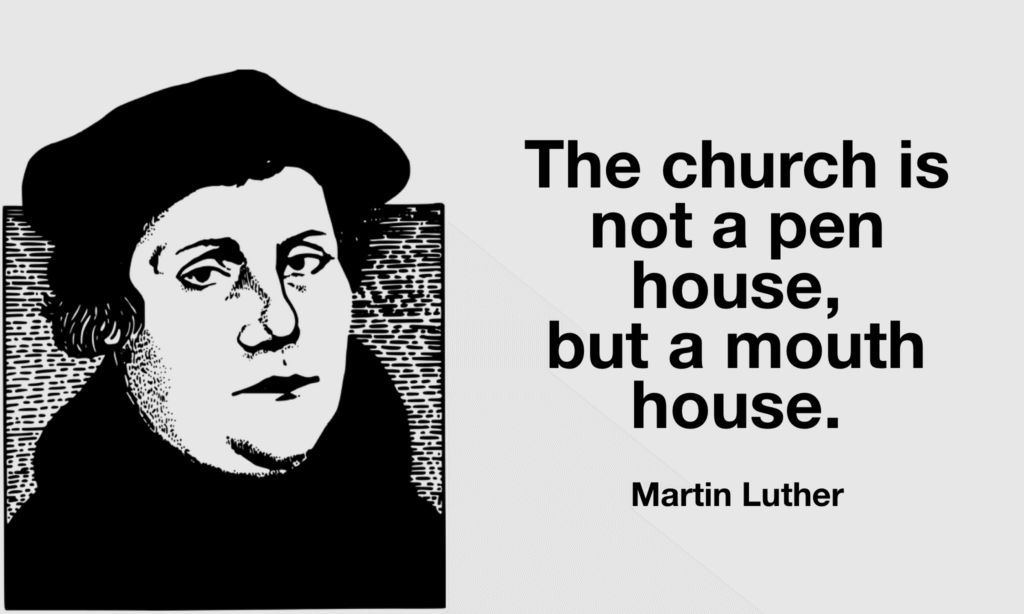
Luther moved preaching from the fringe to the center of the worship gathering.
In the Middle Ages, preaching was a part of the Roman Catholic Mass, but it was optional.4 When it was included, it was far from the focal point of the worship gathering and routinely focused on works and judgment.
As a young man, Luther would have grown up hearing sermons that emphasized the horror of eternal suffering in hell because of sin.
John P. Dolan describes the preaching in this time:
Their sermons were filled with descriptions of burning trees on which hung the souls of those who did not attend church services, vultures gnawing at men’s vitals, venomous serpents stinging the unholy, boiling lakes, frozen fens, heated ovens and vile dungeons. Scripture, when quoted, was completely torn from its living, historical context. Its personalities and their sayings were distorted and mutilated into passive conveniences for moral dilation.5
It is no wonder that Luther wrestled so mightily in his early years with the guilt of his sins. As a result of such preaching, Luther described his early image of Christ as being for him not as “a Mediator, but a judge.”6
Luther’s break from the preaching style of the Catholic Church was a necessary product of his theology of justification by grace through faith. He became revolted by the emphasis in most sermons of salvation by works of the law.7
Preachers missed the true point of the gospel, as Luther discovered through his study of God’s Word, that we are justified by grace through faith, not works (Eph 2:8-9). Therefore, Luther dropped everything he saw as excess in the preaching of his day and focused his preaching on expounding the truth found in Scripture.8
Luther elevated preaching to the central part of the liturgy of the Church. As Alfred E. Gravie claims, “It was Luther who put the sermon in Protestantism in the place held by the mass in Roman Catholicism and made preaching the most potent influence in the churches of the Reformation.”9
Luther did not reinvent preaching, but he led its reform back to the prominence of how he saw it in God’s Word. “The church is not a pen house, but a mouth house,” Luther declared. “For since the advent of Christ the gospel, which used to be hidden in the Scriptures, has become an oral preaching…. Christ himself has not written anything, nor has he ordered anything to be written, but rather to be preached by word of mouth.”10
The focal point of the worship service became hearing God’s Word. Luther based the centrality of preaching on Romans 10:17 because faith is a result of hearing the Word.11
Luther believed preaching was so important that he even wrote, “a Christian congregation should never gather together without the preaching of God’s Word and prayer, no matter how briefly…. Therefore, when God’s Word is not preached, one had better neither sing nor read, or even come together.”12
Luther elevated the sermon to the central position of the worship service, and began the Reformation’s emphasis on the centrality of the sermon. Luther did not invent preaching, but he exalted the sermon to the place of prominence.13
Today, most worship services continue this tradition by centering on the sermon.
The sermon is typically given the largest amount of time and the primary place in the service (after a time of worship so that latecomers won’t miss it). Pastors are typically evaluated and hired by search committees largely on the strength of their preaching. Worship leaders routinely pick songs to compliment the sermon. Even lighting, video, graphics, bulletins, and stage decoration are often produced to focus on the message.
Luther’s emphasis on the centrality of preaching in the worship gathering continues.
2. PREACHING MUST BE FOUNDED ON GOD’S WORD
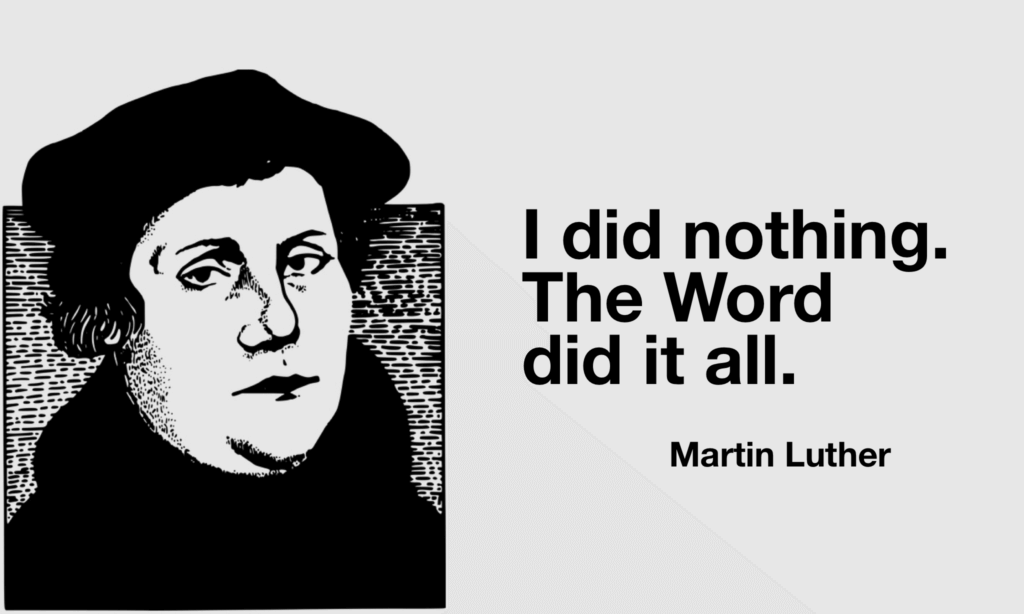
Luther was disgusted by the way preachers of his day misinterpreted Scripture. As noted earlier, preachers in the Middle Ages often took Scripture out of context. The Reformation was sparked because Luther attempted to call the Catholic church back to the teaching of the Bible.
When Luther was scrutinized for his criticism of the authority of the pope, he defended himself based on his standing as a “sworn doctor of holy scripture” who had vowed, “to his beloved holy scripture to preach and teach it faithfully and purely.”14
Luther clearly believed God’s Word had authority even over the pope. In fact, Luther minimized his role in the Reformation by giving all the credit to God’s Word: “I simply taught, preached, wrote God’s Word; otherwise I did nothing. And then, while I slept, or drank Wittenberg beer… the Word so greatly weakened the papacy that never a prince or emperor did such damage to it. I did nothing. The Word did it all.”15
When we read the manuscripts and notes of Luther’s sermons, it is apparent that he mostly focuses on expositing one particular passage of Scripture —typically following the lectionary.16
“In my preaching,” Luther said, “I take pains to treat a verse of Scripture, to stick to it, and so to instruct the people that they can say, ‘That’s what the sermon was about.’”17
And Luther taught his students to do the same. He taught them to approach a difficult passage like Moses approached the rock in the desert: he struck it with his staff until water poured out for the people.18
Likely due to the rampant abuse of Scripture in his day, Luther urged other preachers to stay faithful to God’s Word.
In a sermon in 1515, Luther warned, “Whoever wants to read the Bible must make sure he is not wrong, for the Scriptures can easily be stretched and guided…” Luther continued by explaining his measure for proper interpretation, “he should lead them to the well that is to the cross of Christ, then he will certainly be right and cannot fail.”19
In other words, Luther emphasized that the basis of proper interpretation of Scripture is if it leads to the Jesus. Anything less misses the mark. Therefore, Luther declared, “Nothing but Christ is to be preached.”20 Because he believed Christ is the central message of all Scripture, and that Christ speaks through the sermon.
For Luther, “God’s Word” meant more than just the Bible. God’s Word was not only the Scripture read but also God speaking His words through the preacher.
He believed that preaching is a cooperation of divine and human activity. A preacher is a tool (or the mouthpiece) by which God speaks.21
Therefore, we see why Luther held preaching in such high regard, because in Luther’s words, “just as a man uses the tongue as a tool with which he produces anrd forms words, so God uses our words… as tools with which he himself writes living words in our hearts.”22
The sermon is more than just human words; it carries a divine authority. Conversely, this also meant that the preacher should be dependent upon God for the message because “Where God does not provide the message, a sermon is useless. . . For wherever God does not suggest the words, there is no sermon at all, or it is a vain and pernicious sermon.”23
Therefore, as Luther quipped, “the pastor must be sure that God speaks through his mouth. Otherwise it is time for him to be quiet.”24
John W. Doberstein, in his introduction to Luther’s collected sermons, concludes: “What it all boils down to is a searching challenge to the preacher to believe that God speaks through preaching and preaching alone.”25
Luther was compelled by this concept that God’s Word came alive when read and preached aloud. Consequently, he brought the preaching of God’s Word to a place of primacy in the church in a time when it was neglected and abused.
Luther was influential in refocusing the church on using God’s Word as the foundation for its sermons. And because of his influence, many churches today still base their preaching on the faithful exposition of Scripture.
Some churches still stray. Some preachers still twist and misinterpret Scripture. But the majority of preachers today seek to be faithful to the God’s Word, and we can thank Luther’s influence for helping steer the church back in this direction.
3. PREACHING SHOULD BE IN SIMPLE LANGUAGE
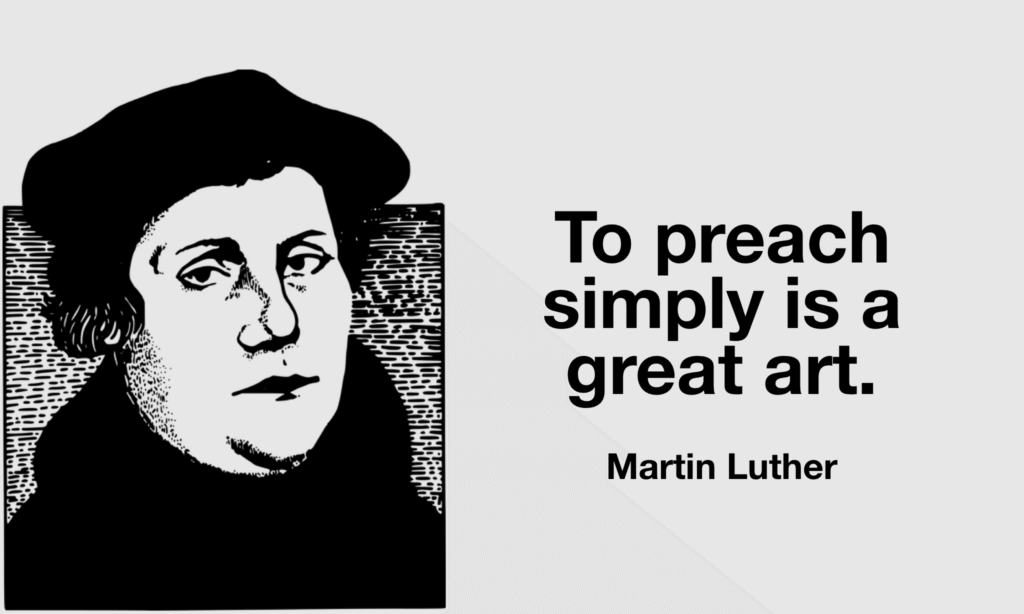
This may sound obvious to us today, but it wasn’t back in the 16th century.
The Catholic Mass was held in Latin, and when preachers spoke in the language of people, they often flaunted their academic knowledge—speaking in ways that ordinary, uneducated people could not easily understand.
Luther may be known for giving the German people a German Bible that they could understand, but he also gave them German preaching that they could understand.
His preaching was intentionally simple. He expelled anything that would difficult for the average person to comprehend.26
Luther’s inspiration for simple preaching was Jesus.
“When Christ preached,” Luther said, “He proceeded quickly to a parable and spoke about sheep, shepherds, wolves, vineyards, fig trees, seeds, fields, plowing. The poor lay people were able to comprehend these things.”27
So Luther followed in the footsteps of Christ. He opened God’s Word, explained the text as simply as he could, and applied it in a conversational style to everyday life situations. Undoubtedly, this is one of the reasons Luther’s countercultural style of preaching was so popular.
Luther had choice words for preachers who ignored the masses and allowed their ego to feed upon complicated sermons filled with academic terminology to impress the social elite:
Cursed be every preacher who aims at lofty topics in the church, looking for his glory and selfishly desiring to please one individual or another. When I preach here, I adapt myself to the circumstances of the common people. I don’t look at the doctors and masters, of whom scarcely forty are present, but I look at the hundred or the thousand young people and children. It’s to them that I devote myself, for they, too, need to understand. If the others don’t want to listen they can leave. Therefore, my dear Bernard, take pains to be simple and direct; don’t consider those who claim to be learned but be a preacher to the unschooled youth and sucklings.28
It is important to note that simple preaching for Luther did not mean simple study.
Luther was still highly educated and committed to the study of the original Greek and Hebrew of the text. He even advocated the study of the original languages in preparation for the sermon.
“Though the faith and the Gospel may be proclaimed by simple preachers without the languages,” said Luther, “such preaching is flat and tame… But when the preacher is versed in the languages, his discourse has freshness and force, the whole of Scripture is treated, and faith finds itself constantly renewed by a continual variety of words and works.”29
However, although Luther encouraged the study of Greek and Hebrew, he despised the use of the original languages in the sermon itself.
He once criticized Zwingli for this reason: “How I do hate people who lug in so many languages as Zwingli does; he spoke Greek and Hebrew in the pulpit at Marburg.”30
So while Luther was proficient in the study of Greek and Hebrew, he never allowed the terminology to show itself in the pulpit.
Luther preferred “to preach in an easy and comprehensible fashion,” he said, “but when it comes to academic disputations watch me in the university; there I’ll make it sharp enough for anybody and will reply, no matter how complicated he wants to be.”31
He reserved the academics for the university. Therefore, for Luther, simple preaching was far from simplistic and easy preaching. He believed, “To preach simply is a great art.”32
Luther’s simple preaching has influenced preaching today. We do not hold our services in foreign languages.
In most churches, it’s rare to hear a preacher who speaks in such an academic way that the congregation cannot understand.
Although there are exceptions, like Luther, most pastors today make an effort to preach in a way that everyone in the audience can understand.
Luther did not pioneer this preaching style—Jesus did—but he helped the church return to the example of Christ.
CONCLUSION
Martin Luther’s reform of Catholic preaching has left a lasting impact on how Protestant preaching continues today.
It was largely because of Luther that Protestant worship came to be symbolized by a preacher in the pulpit opening the Bible, in comparison to the Catholic imagery of a priest at an altar performing a ritual.33
Luther’s emphasis on preaching being central to the worship gathering, being founded on God’s Word, and being spoken in simplicity only begin to scratch the surface of how this Reformer’s teaching and example created a ripple in history that continues to influence the church today.
Notes:
- Scott H. Hendrix, Martin Luther: Visionary Reformer (Wales: Yale University Press, 2015), 45. ↩︎
- Derek W.H. Thomas, The Legacy of Luther, Kindle ed. (ed. R.C. Sproul and Stephen J. Nichols; Orlando, FL: Reformation Trust, 2016), Location 6148. ↩︎
- John T. Pless, “Martin Luther: Preacher of the Cross,” Concordia Theological Quarterly 51 (1987): 86. ↩︎
- Pless, “Preacher of the Cross,” 90. ↩︎
- Pless, “Preacher of the Cross,” 85. ↩︎
- Dennis Ngien, “Theology of Preaching in Martin Luther,” Themelios 28.2 (2003): 35. ↩︎
- Ngien, “Theology of Preaching,” 34-35. ↩︎
- Pless, “Preacher of the Cross,” 91. ↩︎
- Pless, “Preacher of the Cross,” 91. ↩︎
- Arthur Skevington Wood, Captive to the Word: Martin Luther, Doctor of Sacred Scripture (Exeter: Paternoster Press, 1969) 90. ↩︎
- Pless, “Preacher of the Cross,” 89. ↩︎
- Pless, “Preacher of the Cross,” 89-90. ↩︎
- Roland H. Bainton, Here I Stand: A Life of Martin Luther, Kindle ed. (Nashville: Abingdon Press, 2013), 359. ↩︎
- Hendrix, Visionary Reformer, 48. ↩︎
- Timothy George, Theology of the Reformers (Nashville, TN: B&H 2013), 54-55. ↩︎
- Wood, Captive to the Word, 89. ↩︎
- Patrick Ferry, “Martin Luther on Preaching: Promises and Problems of the Sermon as a Source of Reformation History and as an Instrument of the Reformation,” Concordia Theological Quarterly 54 (1990): 273. ↩︎
- Thomas, “Luther As Preacher,” Location 6181. ↩︎
- Heiko A. Oberman, Luther: A Man Between God and the Devil (London: Yale University Press, 2006) 173. ↩︎
- John W. Doberstein, ed., Luther’s Works vol.51 (Philadelphia: Fortress Press, 1959) XIX-XX. ↩︎
- Ngien, “Theology of Preaching,” 29. ↩︎
- Ngien, “Theology of Preaching,” 32. ↩︎
- Ferry, “Luther on Preaching,” 273. ↩︎
- Thomas, “Luther As Preacher,” Location 6132. ↩︎
- Doberstein, Luther’s Works, XX-XXI. ↩︎
- Ferry, “Luther on Preaching,” 273. ↩︎
- Ferry, “Luther on Preaching,” 273. ↩︎
- Pless, “Preacher of the Cross,” 91-92. ↩︎
- Thomas, “Luther As Preacher,” Location 6209. ↩︎
- Thomas, “Luther As Preacher,” Location 6203. ↩︎
- Pless, “Preacher of the Cross,” 92. ↩︎
- Wood, Captive to the Word, 92. ↩︎
- George, Theology of the Reformers, 91-92. ↩︎

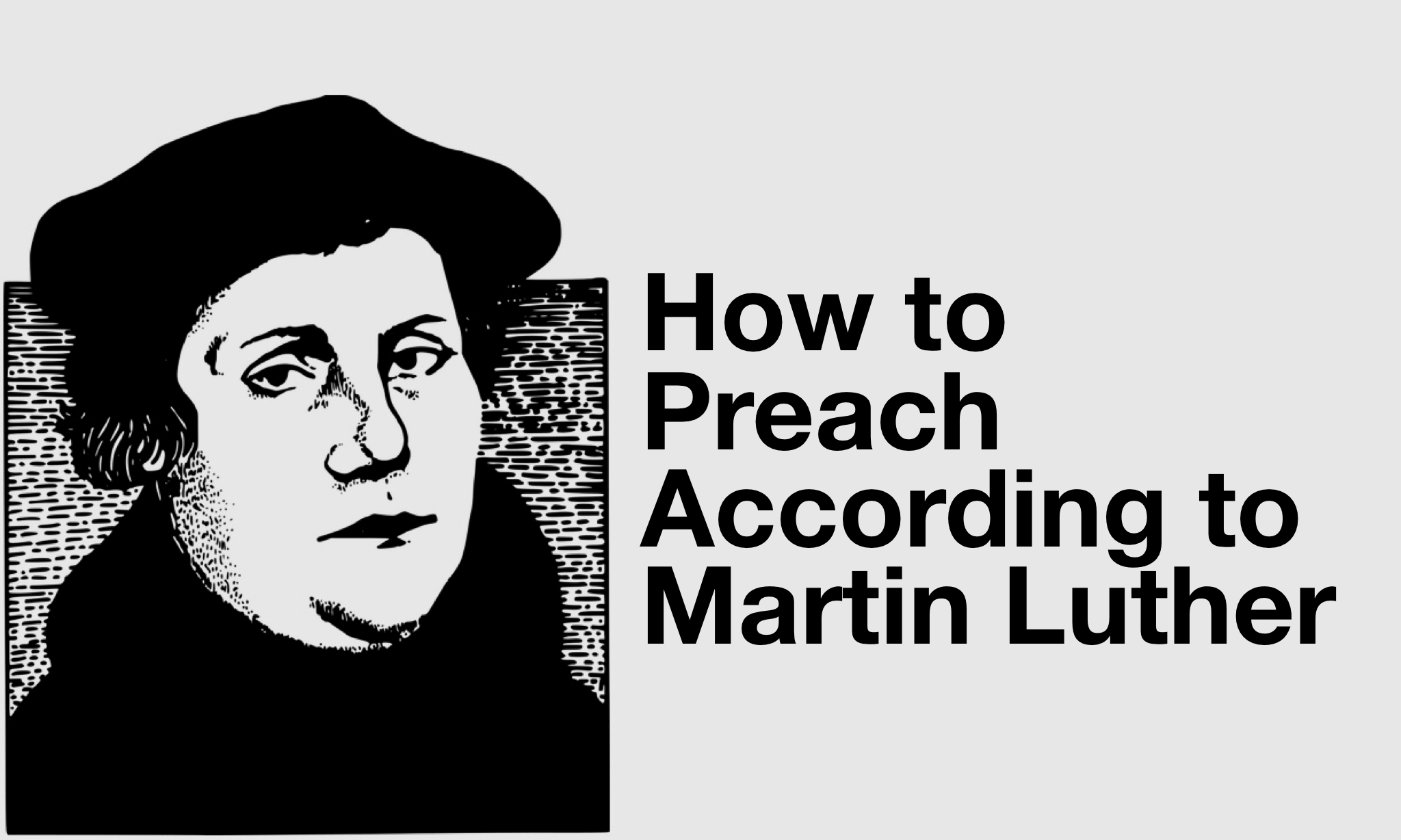

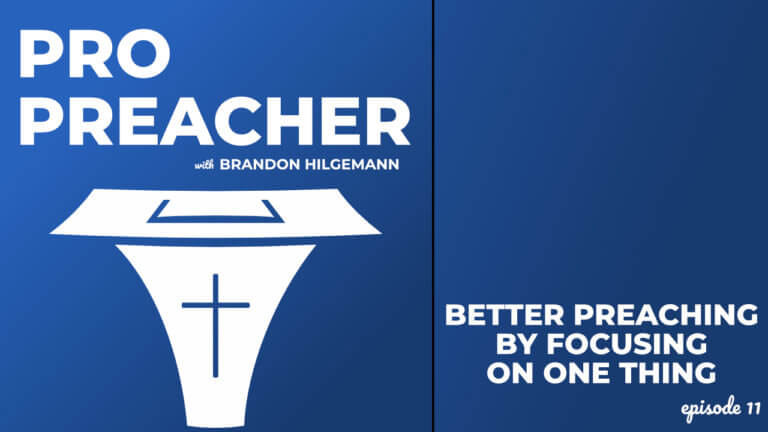

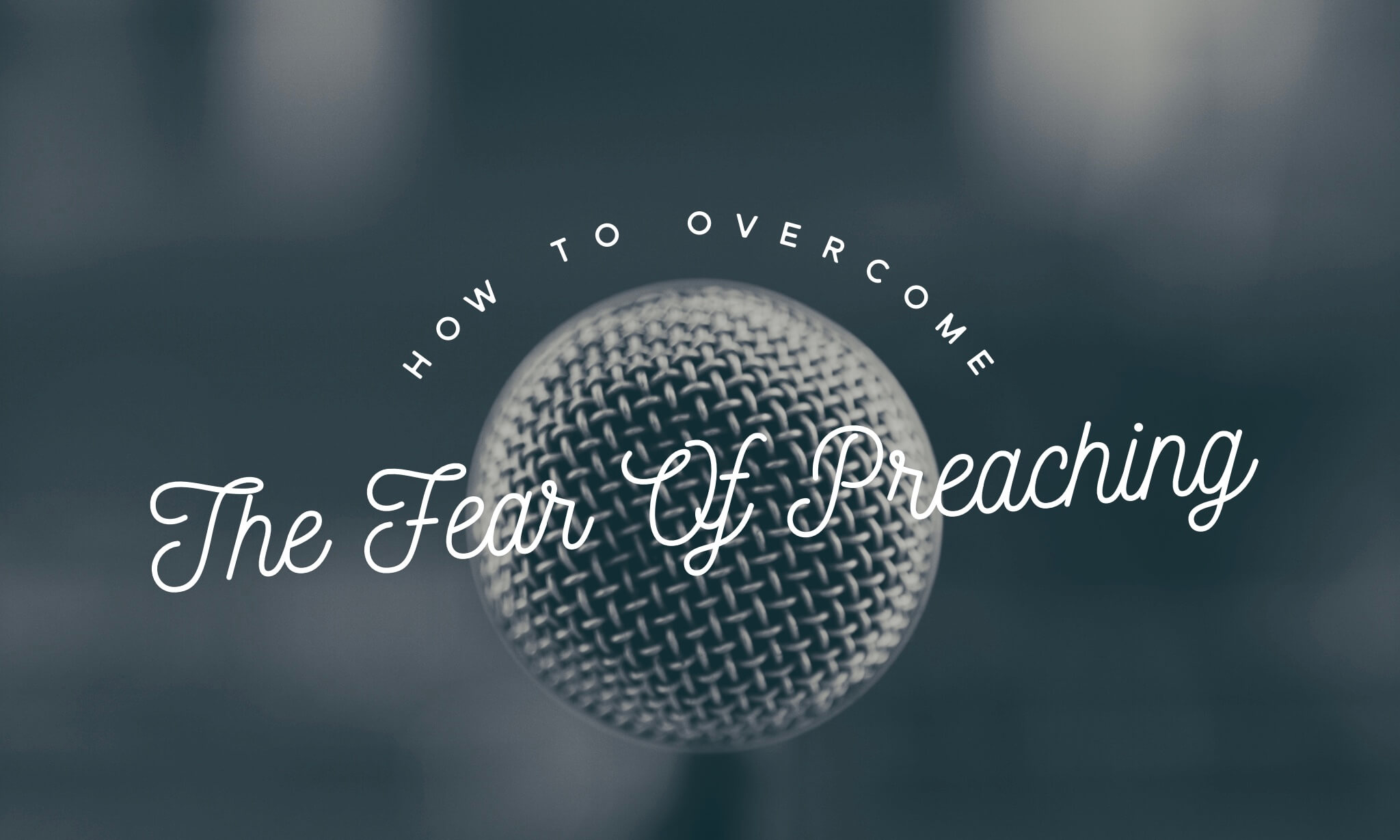
Dear Dr Hilgeman, is at a time like this in our world, that I stumbled across your article. I was humbled that in this aricle, so many of my questions that I ask when I look around me was not only prevalent in Martin Luther’s time, but he responded to it in the most profound and blessed way. Thank you for this great article, I felt blessed just reading and working through it. May God continue to bless your work. My humble thanks and great appreciation. For me, this article indeed spells the new dawn in my life.
Thank you for this wonderful article, that God can bless all who are beginning their journey as minister of the Lord.
You’re welcome. So happy to hear that you found this helpful. God bless!